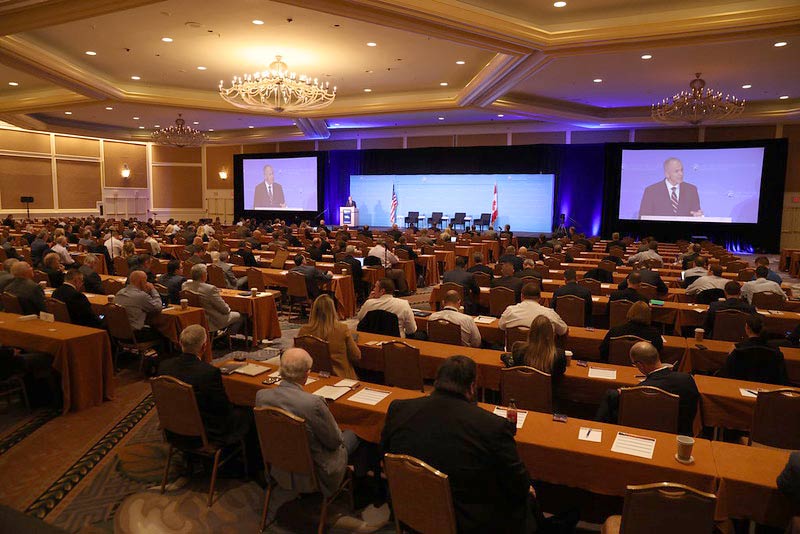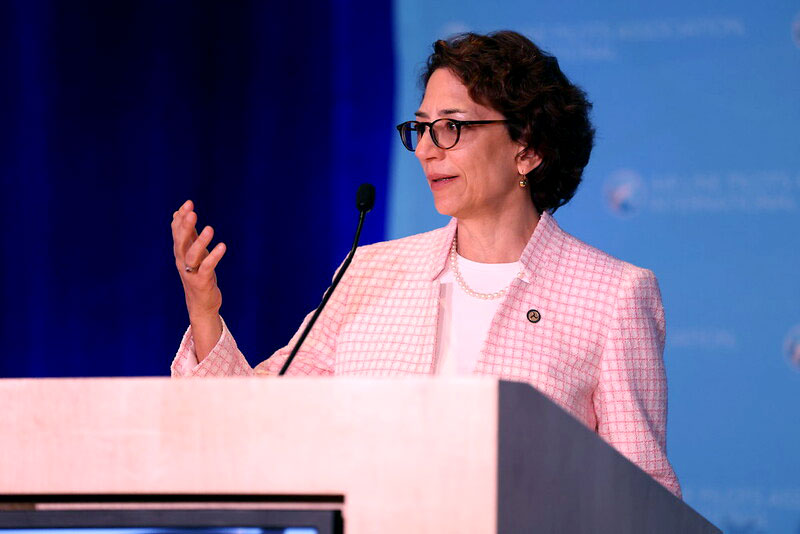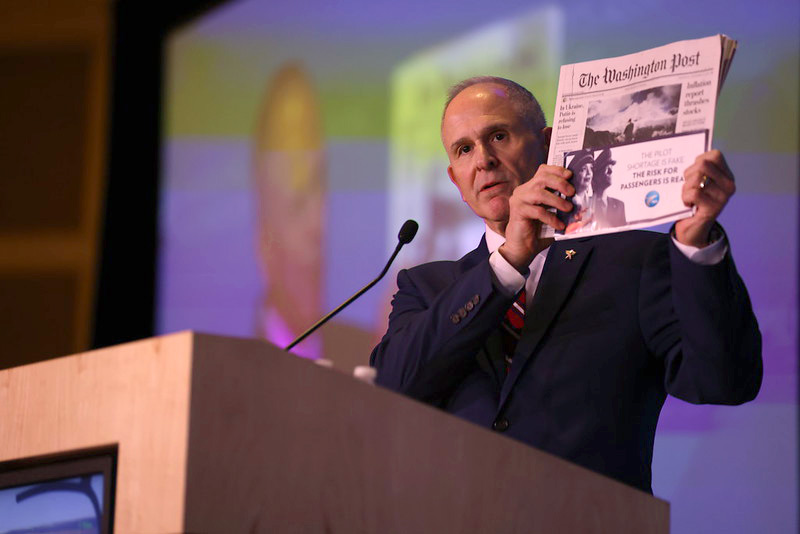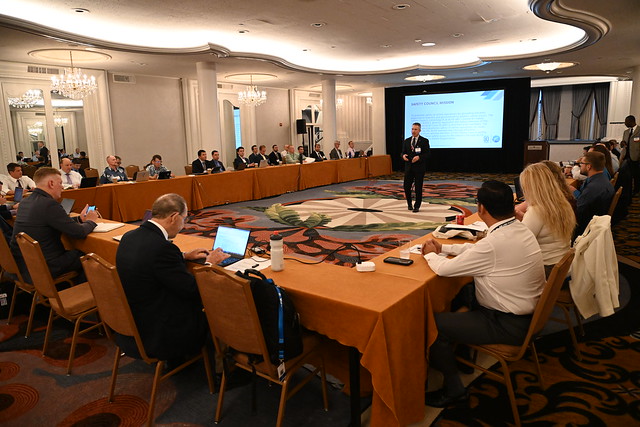Air Safety Forum News
On September 12–15, 2022, more than 450 members of the international aviation community joined ALPA and the Air Safety Organization for the union’s 66th Air Safety Forum (ASF) in Washington, D.C. The four-day conference kicked off on Monday with two days of private ALPA sessions and the Pilot Peer Support Symposium, and on Wednesday, the ASF opened to the public with an impressive guest list.
Convening for the first time since pre-COVID, this year’s ASF got right to business tackling hot topics across the aviation industry. The event offers unmatched collaborative and networking opportunities to discuss the future of the industry and the piloting profession, and also highlights the outstanding accomplishments of ALPA pilots.
Keep reading for highlights from the premier aviation safety event of the year.
Air Safety Organization Gets to Business
ALPA’s 66th Air Safety Forum opened on Monday, with invitation-only meetings hosted by the Association’s Air Safety Organization (ASO) in the areas of Safety, Security, Pilot Assistance, and Jumpseat. Nearly all of the ASO groups held sessions over two days. Joined by government and industry experts, the ASO reviewed recent priorities, current issues, and concerns on the horizon.
The Security and Jumpseat groups each hosted two-day forums with panel discussions and keynote speakers. Industry representatives and pilot leaders from other unions shared their experience and expertise with ALPA’s reps.
Other ASO groups that met Monday and Tuesday include Accident Analysis & Prevention, Aircraft Design/Operations, Aeromedical, Airport and Ground Environment, Accident and Investigation Board, Air Traffic Services, Chief Accident Investigation, ALPA Canada, Critical Incident and Response Program chairs, Jumpseat Council, Professional Standards, Safety Council, Safety Information Analysis Programs, Security Council, and Safety Management Systems.
The ALPA Cargo Committee, the ALPA Remote Operations Committee, and the ALPA President’s Committee on Reduced Crew Operations also met this week in conjunction with the Air Safety Forum.
First-Ever Pilot Peer Support Symposium Breaks Down Mental Health Stigma
ALPA’s first-ever Pilot Peer Support Symposium convened on Monday and Tuesday of the 66th Air Safety Forum. Nearly 70 people packed the ballroom with around 50 attendees joining virtually for two days of panel discussions, keynote speakers, and collaboration with outside experts.
Together the group tackled topics such as understanding mental health, finding a mental health provider, how peer support programs have been adapted and supported around the world, the different types of peer programs, peer training, and the necessity of self-care for those providing care.
Adding a personal connection to the topic, Capt. Carlos Vilella (FDX) and Capt. Jonathan Pahl (UAL) each recalled their own path through ALPA’s Pilot Peer Support program and why that prompts them to give back. Capt. Mike Strauss (JBU) related how the loss of two pilot friends motivated him to be that support system for pilots today.
“It’s amazing to get all the passion, all the expertise in one room and just talk,” said F/O John Taylor (UAL), ALPA’s Pilot Assistance Group chair. “It’s like we’re taught to share as peers: doing this alone is not possible.”
F/O Carrie Braun (JBU), ALPA Pilot Peer Support chair, seconded Taylor’s comments. “We wouldn’t be able to do all we do without all your passion,” she said. “I’m truly grateful to all of you attending this week, coming together to help your fellow pilots.”
ALPA Recognizes Pilot Heroes, ASO’s Best
Tuesday evening of the 66th Air Safety Forum (ASF) featured the first of the week’s two awards banquets to recognize the exceptional service and performance—far above the call of duty—of individual ALPA members and Air Safety Organization (ASO) pilot representatives. This year’s banquet is split over two evenings to accommodate not just the 2021 honorees, but also those from the two previous years, when the ASF was postponed due to the COVID-19 pandemic.
66th Air Safety Forum Opens to International Aviation Community

The ballroom was crowded as the Air Safety Forum convened for its first public session since 2019.
Capt. Joe DePete, ALPA president, opened the 66th Air Safety Forum this morning with a keynote speech underscoring that newly released Federal Aviation Administration data shows that the United States has created more than 9,000 certificated aviators over the past year.
“We are on track to produce more than 10,000 this year—a record for pilot production,” he said in his address to the more than 450 members of the international aviation community who attended the conference.
As the leader of the world’s largest nongovernmental aviation safety organization, ALPA’s president made it clear to attendees that the union will oppose “with its full weight, these and any other efforts to evade, undermine, weaken, or repeal first officer qualification, experience, and training requirements.”
DePete cautioned that shortcuts and workarounds simply won’t fly when it comes to protecting the traveling public and frontline workers whose labor drives the air transportation system.
ALPA Reps Lead Collaborative Panels Examining Hot Topics

Highlights from the first public day of the four-day forum included several in-depth discussions led by ALPA pilots joined by industry experts. A panel titled “Health and Air Quality in Aviation” reviewed the cleaning and sanitizing of the flight deck and cabin during COVID, as well as cabin air quality in general. “Training Challenges in a Post-COVID World” pitted training backlogs vs. pilot supply and stressed the importance of maintaining important safety regulations. “Meet the Doctors” looked at aeromedical challenges during COVID and post-pandemic, and “A Renewed Focus on Inflight Disturbances” reviewed the increase of these events and how they’re being addressed.
ASF Guest List Includes Keynotes from DOT’s Trottenberg, NTSB’s Homendy, TSA’s Pekoske, Rep. DeFazio, and a Letter from Capt. Sullenberger

U.S. Department of Transportation Deputy Secretary Polly Trottenberg speaking to ASF attendees on September 14.
Following Capt. DePete’s opening address Wednesday, deputy secretary of the U.S. Department of Transportation Polly Trottenberg gave the opening keynote presentation. Trottenberg, who supports Transportation Secretary Buttigieg in providing leadership and strategic vision for the U.S. Department of Transportation, spoke of ALPA’s advocacy for secondary flight deck barrier requirements for newly manufactured airliners at the highest levels of government, saying, “We are working to get it done.” She also reinforced the DOT’s commitment to aviation safety in saying, “We fully support Congress’ establishment of the 1,500-hour requirement for commercial flights.”
Attendees were also treated to a keynote from the Honorable Jennifer Homendy, chair of the National Transportation Safety Board. Her presentation highlighted the shared safety goals of ALPA and the NTSB, such as safe integration of commercial space operations, maintaining current safety and training standards, and eliminating the cargo carveout in fatigue rules. “Cargo pilots deserve the same protections as those in passenger aviation—and so do their families,” she said.
The impressive keynote speaker list continued with the Honorable David Pekoske, acting administrator for the Transportation Security Administration. He referred to the TSA and ALPA as “partners in aviation security,” stating, “We would not be able to do the work we do—nor would we want to” without the input of ALPA’s pilots. He reviewed a list of items the two organizations work together on, including inflight disturbances, crewmember self-defense training, the new FAMS road map, the Federal Flight Deck Officer (FFDO) program (“I’m a big fan,” he stated), international harmonization of FFDOs, one-stop security, and Known Crewmember.
Capt. Sully Sullenberger (US Airways, ret.), was scheduled to speak, but had to withdraw at the last moment. Instead, he sent in a letter, which Capt. DePete read to the crowd. Sullenberger wrote of his continuing support for safety and the U.S. safety regulations. He promised, “I want you to know you have my full support in this fight,” concluding with, “I am with you in solidarity in keeping our skies safe.”
ALPA Seizes the Opportunity to Protect Aviation Safety with New Ads

Capt. DePete displayed the Association’s latest safety-focused ad campaign, a cover wrap of the Washington Post, in his address on Wednesday. View more photos.
The ASF is not the only aviation conference taking place this week in Washington, D.C., and ALPA is taking advantage of the increased industry presence with a new series of advertisements as part of the Association’s ongoing campaign to protect aviation safety. We are making sure the flying public, industry stakeholders, and Congress are aware of some airlines’ attempts to undermine pilot training and safety rules.
From sponsoring a key transportation newsletter to wrapping our message around the print edition of the Washington Post distributed to Capitol Hill, lawmakers had multiple opportunities to see ALPA’s message that there is no excuse to cut safety. Later this week, a mobile billboard will travel to various aviation conference sites to deliver the message that the safest mode of transportation is at risk.
Rep. DeFazio Says ALPA Activism Advances Aviation
The Honorable Peter DeFazio, chair of the U.S. House Transportation & Infrastructure Committee, topped off the final morning of the 66th Annual Air Safety Forum by supporting several of ALPA’s key initiatives.
“We’re not going to roll back the 1,500-hour rule,” DeFazio said. “We’ve had the safest period in aviation since the mandate.”
DeFazio discussed his years of advocating for aviation improvements and people over profit, from airplane hijackings in the 1970s to leading the fight to ban cigarettes on airplanes and also eliminating the FAA’s “dual mandate” to both regulate safety and promote commercial aviation.
During the pandemic, DeFazio led the passage of the Payroll Support Program, the most proworker relief package in U.S. history, to stabilize our airlines and ensure they had workers ready to drive recovery. “You know that it takes political activism and is all about using the clout that you have, for the Payroll Support Program—which we did three times,” DeFazio said. “It saved the aviation industry.”
He has covered a lot of ground in his 36 years of public service, from aircraft design with the Boeing MAX and the latest with 5G and the telecom industry to introducing the Fair and Open Skies Act numerous times to prevent international flag-of-convenience airlines from operating in the United States.
DeFazio encouraged ALPA pilots to stay involved on the Hill. “Keep flying, and keep being totally engaged,” he said. “Work with your leadership and your political team. And if we do that, we will have the best, safest aviation system in the busiest airspace in the world.”
From Refugee to Pilot Trainee: Kazzembe Shares Aviation Aspirations
On Thursday, ASF attendees heard an inspiring story from an aspiring aviator. Dieudonne Kazzembe, a current senior at Arizona State University (ASU) who was born in the Democratic Republic of Congo, detailed the obstacles he has overcome on his path to the flight deck, showing his own leadership to the many attendees in the room with a call for everyone to follow their passions and conquer their goals.
Honoring Those Who ‘Embody and Exude Perseverance’
ASF week concluded on Thursday, September 15, with an awards banquet to honor pilots receiving ALPA’s highest awards for Air Safety, Aviation Security, Aviation Jumpseat, and Pilot Assistance for 2019, 2020, and 2021. After a two-year pandemic hiatus, more than 40 ASF awards were presented over two evening banquets as well as during a special lunchtime ceremony on Thursday.
Full coverage of the 66th Air Safety Forum will be available in future editions of Air Line Pilot magazine.
-###-




